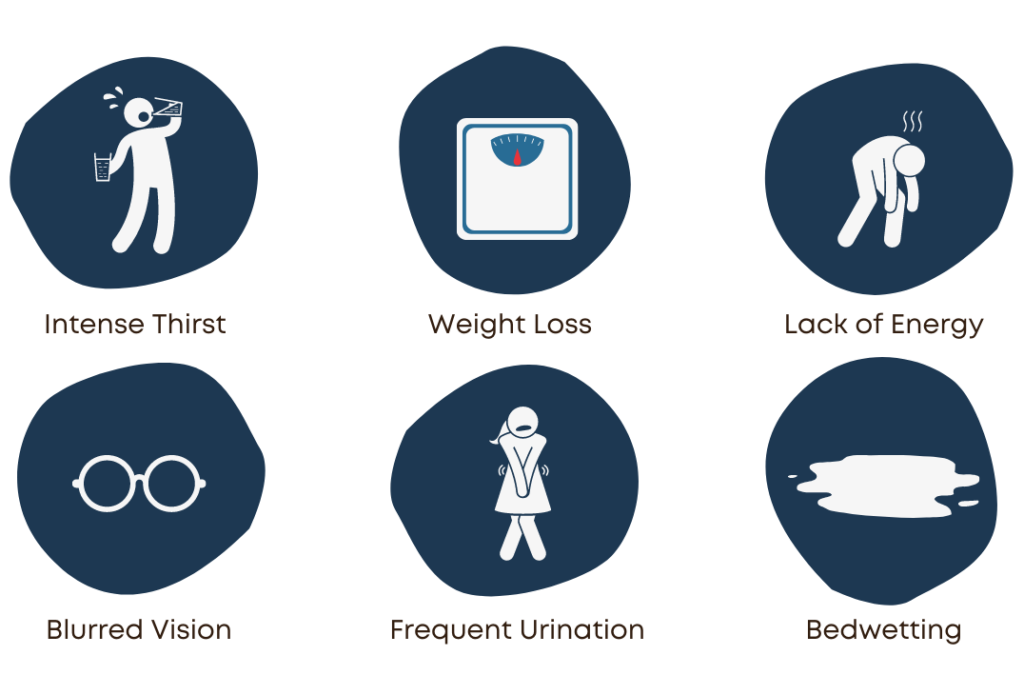About Type 1 Diabetes (continued)
About Type 1 Diabetes
What is Type 1 Diabetes?
What is Type 1 Diabetes?
Type 1 diabetes (T1D) is an auto-immune disease in which the body gets confused and begins to attack itself. Specifically, it attacks the cells in the pancreas that make insulin. Insulin is a very important hormone that helps sugar enter our cells to provide energy. As the immune attack continues, less and less insulin cells remain. When they are not able to put out enough insulin to maintain normal blood sugar levels, it affects normal body functions. It can even be life threatening if not found and treated promptly.
Type 1 diabetes (T1D) is an auto-immune disease in which the body gets confused and begins to attack itself. Specifically, it attacks the cells in the pancreas that make insulin. Insulin is a very important hormone that helps sugar enter our cells to provide energy. As the immune attack continues, less and less insulin cells remain. When they are not able to put out enough insulin to maintain normal blood sugar levels, it affects normal body functions. It can even be life threatening if not found and treated promptly.
What Causes Type 1 Diabetes?
We don’t know exactly what causes the body to begin this attack on itself. Published research studies suggest that, in some cases, a virus may trigger the start of the process. A person’s genes and diet may also play a role, and researchers like us are working hard to learn more.
What Causes Type 1 Diabetes?
We don’t know exactly what causes the body to begin this attack on itself. Published research studies suggest that, in some cases, a virus may trigger the start of the process. A person’s genes and diet may also play a role, and researchers like us are working hard to learn more.
What are the Symptoms of Type 1 Diabetes?
Some of the common symptoms of type 1 diabetes are:

What are the Symptoms of Type 1 Diabetes?
Some of the common symptoms of type 1 diabetes are:

How Does Type 1 Diabetes Develop?
We now know the disease process leading up to childhood diabetes starts before any symptoms or high blood sugar develops. There are three stages of T1D.
How Does Type 1 Diabetes Develop?
We now know the disease process leading up to childhood diabetes starts before any symptoms or high blood sugar develops. There are three stages of T1D.
In the first stage, the body develops auto-antibodies signifying the body has begun attacking the islet cells.The body is still producing enough insulin and people have no symptoms.
In the second stage, enough islet cells have been destroyed to start affecting blood sugar levels. A person in this stage may have mild elevations in blood sugar, but they usually will not notice any symptoms.
In the third stage, most of the islet cells have been destroyed. The body can no longer produce enough insulin. Blood sugar goes high. Symptoms become more severe as time passes and can be life-threatening unless medical therapy is started.
In the first stage, the body develops auto-antibodies signifying the body has begun attacking the islet cells.The body is still producing enough insulin and people have no symptoms.
In the second stage, enough islet cells have been destroyed to start affecting blood sugar levels. A person in this stage may have mild elevations in blood sugar, but they usually will not notice any symptoms.
In the third stage, most of the islet cells have been destroyed. The body can no longer produce enough insulin. Blood sugar goes high. Symptoms become more severe as time passes and can be life-threatening unless medical therapy is started.